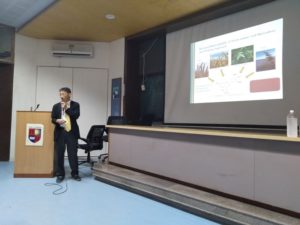
On the 27th of September 2019, the Chemical Engineering Department was fortunate enough to play host to Dr. Mamoru Koketsu, a Senior Professor at Gifu University, Japan. Dr. Koketsu is currently, the Vice Director of Organization for the Promotion of Higher Education and Student Support at Gifu University. He has also served as the Vice Dean (Academic Affairs) at the Faculty of Engineering, Gifu University. He is the recipient of many prestigious awards including the Industrial Technical Award (Osaka Technical Research Association) and the Young Researchers Award (Society of Synthetic Organic Chemistry, Osaka, Japan).
The session included a lecture by the professor on the topic. ?Chemical Approach to Active Compound Derivatives? and was attended by Semester 5 students. The lecture was held in A-101 Seminar Hall (A-Block).
Dr. Koketsu talked about the extraction of activated compounds from plant extracts and animal proteins that can be isolated to formulate anti-viral drugs and cancer drugs.
The first part of his lecture was titled, ?Increased Bioavailability of Tricin-amino Acid Derivatives via a prodrug approach?. Tricin comes from a family of compounds called Flavonoids, which in turn constitute a large family of natural products that can be found in nearly all plant species. Dr. Koketsu?s research focussed on finding ways to increase the bioavailability of tricin ? a derivative that has shown promise as a anti-HCMV drug. To that end, the professor and his team synthesized several amino acid derivatives of tricin as prodrugs and evaluated the relative cell permeabilities and half-lives of the tricin-amino acid derivatives in male rats. The results demonstrated that the tricin-alanine-glutamic acid conjugate (T-Ala-Glu) exhibited excellent bioavailability after oral administration, which was clearly confirmed by an increase in cellular permeability.
The second part of Dr. Koketsu?s lecture was titled, ?Phytochemical Analysis and Antiluekemic Activity of Polyphenolic Constituents of Toona sinensis?. Toona sinesis is a traditional Chinese medicine plant which contains compounds that inhibit cell proliferation and induced apoptosis in human leukemia HL-60 cells. The professor gave an in-depth explanation of the analytical methods used in the phytochemical research of the plant?s extract and the techniques that were used to isolate polyphenolic constituents. The team?s research revealed the importance of T. sinensis as a chemopreventive medicinal plant and the structural analysis of the isolated compounds indicated that the antileukemic properties of the plant could be attributed to 2 galloyl groups of Loropetalin G.
Dr. Koketsu gave an in-depth explanation of the various analytical techniques used to identify and isolate the compounds and it was extremely interesting to correlate that information to the concepts of analytical techniques that we had learnt as Semester 3 students.
Drug Research is one of fastest growing research fields in Chemical Engineering and it was a privilege for all of us to gain knowledge from someone so closely associated with and highly experienced in this area. We are extremely grateful to Dr. Koketsu for taking the time to talk to us about his projects and to the Department of Chemical Engineering, Nirma University for organising this lecture.